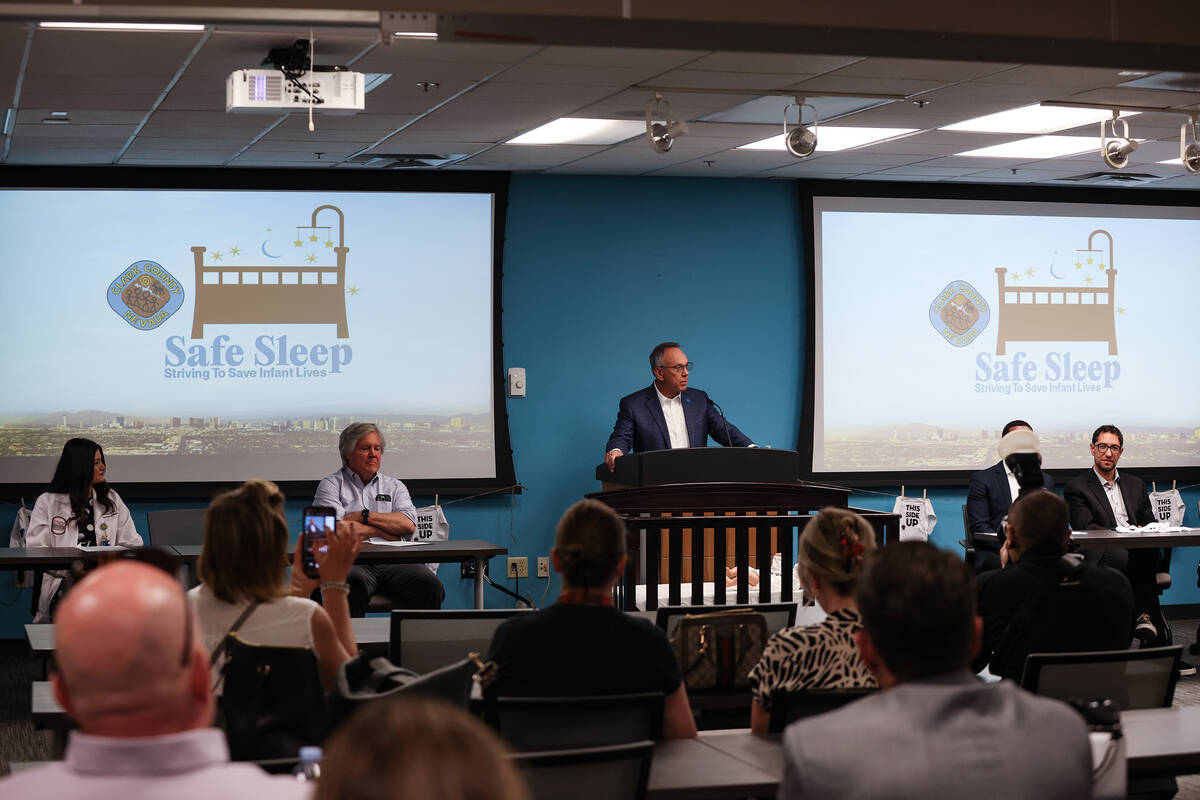How parents can avoid the worst day of their lives
A Clark County coalition hopes to keep new parents from experiencing what could forever be known as the worst day of their lives.
On Thursday, the group launched a campaign to emphasize the dangers to infants from what might seem to be an innocuous activity: sleeping.
In 2021 and again in 2022, Las Vegas police responded to 24 infant deaths related to co-sleeping, which is when an infant sleeps with a parent. The youngest infant was just six days old.
Detective Jessica Rogers with the Metropolitan Police Department’s abuse and neglect unit has witnessed the devastation of parents on what “may be known as forever the worst days of their lives,” she said.
“These cases are 100 percent preventable,” said Rogers, who provided the limited data. “There is no safe way to co-sleep with your child.”
This was one of the messages at an afternoon media briefing to launch the Safe Sleep campaign, a collaboration of the Clark County Department of Family Services, the Nevada chapter of the American Academy of Pediatrics and University Medical Center.
Each year more than 3,000 babies in the U.S. die suddenly and unexpectedly while they’re sleeping, according to a public service announcement previewed at the event. Suffocation and strangulation in an unsafe sleep environment is the leading cause of death for infants under age 1, the announcement said.
Guidance given at the briefing included that infants should sleep alone in their crib, face up, lying on their back. They should sleep on a firm surface covered by a sheet only, without soft toys, blankets, soft bedding or crib bumpers, which pose a suffocation danger. Wearable blankets can be used to keep a baby warm.
A national education campaign in the 1990s to put babies on their backs for sleeping resulted in a substantial decline in deaths, said Leann McAllister, executive director of the Nevada chapter of the American Academy of Pediatrics.
Last year, the academy revised its guidelines to emphasize the increased hazard of co-sleeping on a soft surface or chair, or when the parent is impaired by drugs or alcohol, for instance.
The association also recommends that the baby’s crib or bassinet be kept in the parents’ room, close to their bed, for at least six months and preferably until the baby is 1.
After the briefing, nurses with UMC described in an interview how these deaths occur and what they’re doing to educate parents about prevention.
“The parent can roll over on the baby, of course,” said Yelena Abi-Nader, clinical nurse manager of UMC’s perinatal unit.
“But also these little babies, they are strong enough to wiggle, but not necessarily cognitively developed enough yet to be able to get themselves away from danger, or physically strong enough to move their head away from where they find themselves,” she said. Where they find themselves may with their nose and mouth up again something, leading to suffocation.
Perinatal nurse Marcie Vickers said part of her job is to educate the families of newborns — not just the parents, but the grandparents and the whole family — on safe sleeping practices.
“Whatever sleep practices they used way back when, they’re still passing on to their daughters now or sons,” she said.
The campaign will include public service announcements, educational materials and resources for parents in Clark County. More information in both English and Spanish can be found at clarkcountynv.gov/safesleep.
^
Contact Mary Hynes at mhynes@reviewjournal.com or 702-383-0336. Follow @MaryHynes1 on Twitter.



























